
A slot is a narrow opening or gap, usually slit-like, that allows something to pass through, as in a door, window, or slot machine. The term is also used for a position or assignment, such as an office job or a berth in a ship’s crew or a time slot in a program or schedule. The job of chief copy editor at the Gazette was a slot that he had held for 20 years.
In sports, a slot receiver is an offensive football player who lines up wide and is tasked with running precision routes across the field. Typically shorter and faster than outside wide receivers, a slot receiver needs to have top-notch route-running skills in order to maximize the effectiveness of their team’s passing game.
To play an online slot, a player will first need to sign up for an account at an online casino. Once logged in, they will be able to choose the type of slot game they would like to play and then place their bets. Once they have placed their bets, the digital reels with symbols will begin to spin repeatedly until they stop and the corresponding symbols in the pay line determine if the player has won or lost.
Slots are available in a variety of different shapes and sizes, but all slots will have a payline which is a line that crosses each reel to determine if a winning combination has been formed. Some slot machines will have one pay line while others may have multiple. A common feature of slot machines is a jackpot or bonus round where players can win large amounts of money.
The probability of winning a slot depends on the variance, which is a measure of risk. A low-variance slot will have a lower chance of paying out but will give larger wins when it does. A high-variance slot will have a higher chance of paying out but will have smaller wins.
While casinos have an edge over players, there is always the possibility that a lucky streak of good luck will blow the payout percentage out of the water. This is why some people love to play slots – they can be extremely lucrative if the player has the right strategy.
To play a slot machine, a player must insert cash or, in “ticket-in, ticket-out” machines, a paper ticket with a barcode into a designated slot on the machine. The machine then activates the reels to spin and, when a winning combination is made, the player earns credits according to a pay table. Pay tables vary by machine, but classic symbols include fruit, bells, and stylized lucky sevens. Most slot games have a theme and bonus features that align with that theme. Some slots have a progressive jackpot or other special features. Unlike electromechanical machines, which had tilt switches that could break circuits, modern electronic slot machines are designed to be safe from tampering or tilting.